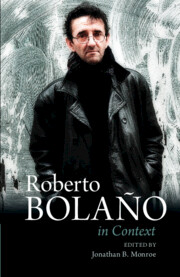Book contents
- Roberto Bolaño in Context
- Roberto Bolaño in Context
- Copyright page
- Contents
- Contributors
- Chronology
- Part I Geographical, Social, and Historical Contexts
- Part II Shaping Events and Literary History
- Chapter 9 France, Spain, 1938
- Chapter 10 The Cold War
- Chapter 11 After the Fall of the Wall: 1989–2001
- Chapter 12 Latin American Literature
- Chapter 13 French Connections
- Chapter 14 German and Russian Precursors
- Chapter 15 After the Two 9/11s: Santiago, 1973, New York, 2001
- Part III Genres, Discourses, Media
- Part IV Aesthetics, Culture, and Politics
- Further Reading
- Index
Chapter 9 - France, Spain, 1938
from Part II - Shaping Events and Literary History
Published online by Cambridge University Press: 15 December 2022
- Roberto Bolaño in Context
- Roberto Bolaño in Context
- Copyright page
- Contents
- Contributors
- Chronology
- Part I Geographical, Social, and Historical Contexts
- Part II Shaping Events and Literary History
- Chapter 9 France, Spain, 1938
- Chapter 10 The Cold War
- Chapter 11 After the Fall of the Wall: 1989–2001
- Chapter 12 Latin American Literature
- Chapter 13 French Connections
- Chapter 14 German and Russian Precursors
- Chapter 15 After the Two 9/11s: Santiago, 1973, New York, 2001
- Part III Genres, Discourses, Media
- Part IV Aesthetics, Culture, and Politics
- Further Reading
- Index
Summary
Set in Paris, Bolaño’s deeply contextualized novel, Monsieur Pain, takes place in a historical moment heightened with geopolitical tensions. The Spanish Civil War is raging, fascism is on the rise; Europe is looking back at the devastation of the Great War and forward to another world war. César Vallejo – the exiled Peruvian poet, a communist and supporter of the doomed Spanish Republic – is dying in Paris, stricken by incessant hiccups. Pierre Pain, a mesmerist who tries and fails to cure Vallejo, becomes drawn into a noirish intrigue he never manages to decipher. Layered upon this immediate context are other moments drawn from Bolaño’s own lived experience: the Cuban Revolution, the Latin-American liberation movements of the 1960s, the Tlatelolco massacre, Pinochet’s coup, the Dirty War in Argentina. Failure thus becomes the ultimate context of this novel, operating on multiple levels both within the diegesis and beyond: Pain’s failure implicitly points to all the defeats and betrayals of twentieth-century emancipatory projects; the novel sets readers up for failure by thwarting our efforts to navigate the dense intertextual web and by foreclosing resolution; and on the level of literary language the text admits and indeed announces its own failure as written expression.
- Type
- Chapter
- Information
- Roberto Bolaño In Context , pp. 101 - 112Publisher: Cambridge University PressPrint publication year: 2023

